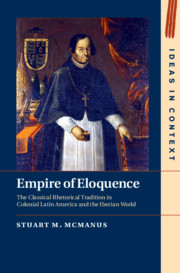 Empire of Eloquence
Empire of Eloquence Published online by Cambridge University Press: 09 April 2021
Chapter 6 turns to the disintegration of the political unity of the Iberian World, and addresses the role of the classical rhetorical tradition in spreading new and even revolutionary ideas in both the Atlantic and the Pacific (c. 1750–1850). It begins by showing that new Enlightenment wine was frequently put in post-humanist bottles, focusing on the orations delivered in the Patriotic Economic Societies (sociedades de amigos del país) in Spain and the Philippines. It then shows that a similar pattern can be seen in the oratory of the Age of Revolutions in Mexico. While the public ceremonial oratory of the early Mexican Republic is often portrayed as having arisen spontaneously to fulfill the needs of the new nation, this chapter argues that this was merely the last in a long line of applications in the Iberian World of a tool of social ordering inherited from Mediterranean antiquity.
To save this book to your Kindle, first ensure [email protected] is added to your Approved Personal Document E-mail List under your Personal Document Settings on the Manage Your Content and Devices page of your Amazon account. Then enter the ‘name’ part of your Kindle email address below. Find out more about saving to your Kindle.
Note you can select to save to either the @free.kindle.com or @kindle.com variations. ‘@free.kindle.com’ emails are free but can only be saved to your device when it is connected to wi-fi. ‘@kindle.com’ emails can be delivered even when you are not connected to wi-fi, but note that service fees apply.
Find out more about the Kindle Personal Document Service.
To save content items to your account, please confirm that you agree to abide by our usage policies. If this is the first time you use this feature, you will be asked to authorise Cambridge Core to connect with your account. Find out more about saving content to Dropbox.
To save content items to your account, please confirm that you agree to abide by our usage policies. If this is the first time you use this feature, you will be asked to authorise Cambridge Core to connect with your account. Find out more about saving content to Google Drive.